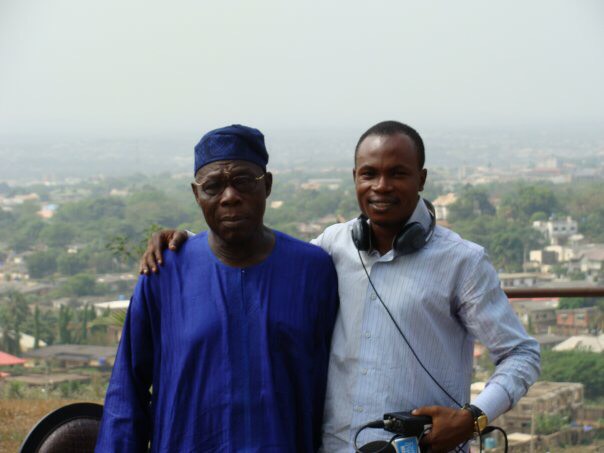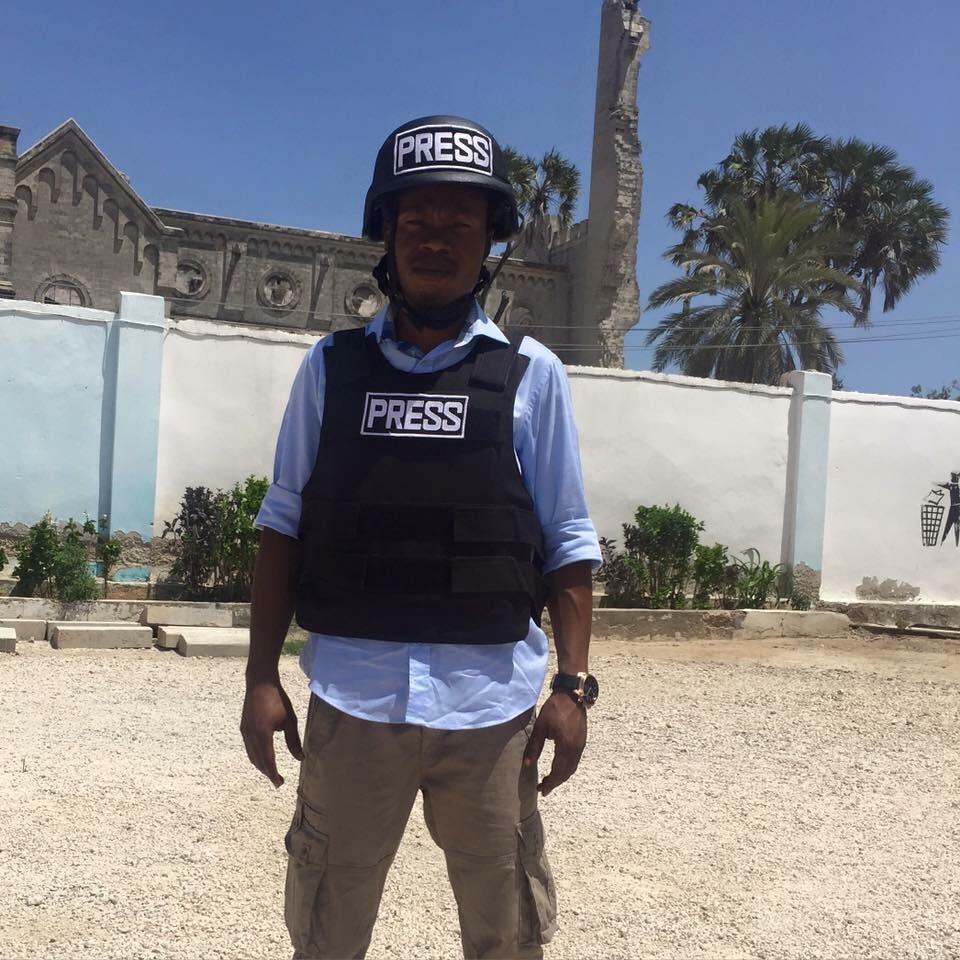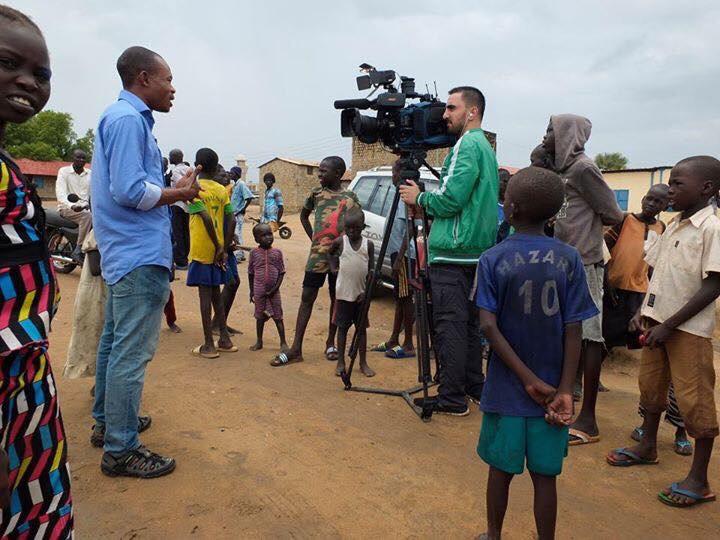From being an intern and staff of Rhythm FM in Lagos and Abuja, Fidelis Mbah has moved on to become an international journalist with work experience in six foreign media organisations.
He is presently Deputy Director at CGTN Africa, the African bureau of China Global Television Network. Before joining CGTN, he worked for TRT World, Aljazeera English, Associated Press, NBC News and BBC News
In this interview with www.mediacareerng.org , Mbah shares his wide experience on what it takes to be an international journalist.
How did you become a journalist?
My ambition as a child was to be a banker. I never wanted to be a journalist until I finished junior secondary. I left my parents to stay with a family friend, and that changed my career ambition. He was an ardent listener of international radio stations like BBC World Service and the Voice of America. Unconsciously, I developed interest in the radio programmes. He also ‘forced’ me to read newspapers daily and would often ask me questions based on news items I read.
That rekindled my interest in journalism and I began to aspire to be like the journalists I listened to on radio. My childhood friend, Jackson Ude (US-based journalist) enrolled for a journalism course after college and also encouraged me to join him to realise my ambition – I did and today I am grateful I followed my passion.
While studying for a higher diploma in journalism programme at the Nigerian Institute of Journalism, Lagos, I started looking out for opportunities to gain work experience. I approached Rhythm 93.7FM, Lagos, in August 1998 but they declined my request for employment due to lack of experience but I never gave up. They offered me internship (without pay) which I gladly accepted. I started earning allowances six months after my internship was extended. I was an intern at Rhythm FM for a year before I was offered a contract position as a reporter. I worked hard and in 2001 I was made a news editor and transferred to the Abuja station, Rhythm 94.7FM. I rose to become the Head of news in 2003 and left the organisation in 2004 for development communication.
What was your experience working as a journalist in the country before you were hired by the international media houses you have been working for?
Practicing in Nigeria was challenging because of the peculiar environment. I covered nearly everything from politics, sports, entertainment, and humanitarian crisis to conflict. I had very little budget to follow up stories, no protection for investigative reports, no insurance cover, and access to top sources/public officials were limited.
How did you move from being a Nigerian based journalist to working for international media houses?
I left active journalism in 2004 for a little more than two years for development communication and media research. I was on radio and TV for news and sports analyses while doing media research. I returned to journalism in 2007 when I was hired as Nigeria correspondent by the BBC World Service.
I reported across West Africa and ended up in the London office as a multimedia producer in 2012. I was also doing freelance work for UN IRIN service. I returned to Nigeria in September 2013 and took up an offer with Gotel TV, Yola, as a news consultant for their international channel. I did freelance work for US-based NBC News, and Associated Press (AP) during my stint in Yola. I joined Aljazeera English as a field producer in May 2014. I relocated to Turkey in June, 2015 to take up a position as senior producer/reporter with TRTWORLD. I left after more than 2 years. Presently, I’m a Deputy Director with CGTN Africa (CCTV News).

What have you had to do to get hired by the various organisations you have worked for?
I have tried to work hard to distinguish myself in whatever role I have been privileged to perform. I always try to think out of the box, improve my work, and justified the confidence reposed in me by my employers.
What are the major requirements for working for international media organisations?
International media organisations are not looking for lazy journalists. You have to earn every cent you are paid by working really hard. No room for ‘copy and paste’ journalism. You must be on top of your game and compete with your contemporaries. You have to be a thorough-bred professional with a clear understanding of your role. Research is key; you have to thoroughly fact-check your reports – no complacency.
What are some major assignments you have covered and what was it like covering them?
My major assignments in Nigeria were the religious crisis in Plateau state and the Niger Delta crisis. I was almost mobbed at a mosque in Jos due to mistaken identity. I travelled across the Niger delta creeks in search of militants, kidnap victims and oil spill sites.
I am presently working on a book based on my experience reporting from the Niger delta. Internationally, I have reported across Asia, Europe and Africa. I have covered the Syrian crisis, Turkey coup fallout, war in Somalia, conflict in South Sudan, Humanitarian crisis in Uganda, political crisis in Kenya, political and economic developments in the UK, Rwanda, Madagascar, Tanzania, Mozambique, Ghana, Ivory Coast, Togo, Benin, and The Gambia etc.

What have been some of your memorable experiences on the job?
I have interviewed major news makers like presidents, chief executives of multinational firms, political leaders, international football stars, militant group leaders, war victims, and music stars. I have covered major breaking news across the world and travelled to areas with very limited access for information gathering.
What hazards have you had to contend with?
I have survived attacks in Somalia and the Turkey-Syria border. I have been arrested, detained and harassed by security agents a couple of times.
What are the challenges of being an international journalists?
The risk factor is very high. You travel to very dangerous places for news gathering and sometimes risk arrest and kidnap. You must be seen to be objective at all times – your opinions mostly do not count. You must be seen to be above mistakes.

International media organisations have always been accused of not properly projecting Africa. What is your view on this issue?
Every international media organisation has got an agenda. That’s a fact. International media mostly report things as they see it. The slant they use is based on their interests. I have never been forced by all the media I worked for to say negative things about Africa. You may not like their news approach but you can’t fault the facts.
You don’t expect an international media to ignore bad things happening in your country and concentrate on only the positives. African governments can help improve reportage of their activities by being more transparent, accessible, and fulfilling their electoral promises. If there is no case of corruption, human rights abuses, and poor infrastructure, no journalist will report that such exist if they don’t.
What is your advice for journalists interested in working for international media organisations?
Work hard, look out for opportunities, improve your skills and distinguish yourself among colleagues.
What is your assessment of media practice in Nigeria?
There are still a few experienced people who are working really hard but with limited resources. The non-payment of salaries is a big minus to media practice in Nigeria as it is ‘killing’ objectivity and investigative journalism.
There are so many inexperienced people parading as journalists now. Some resort to blackmail to extort; giving room for fake news. The sudden surge in the number of blogs has resulted in most people parading as journalists and it if not properly regulated, will further drag down the quality of journalism in the country.


This is encouraging, deep, insightful and informative.